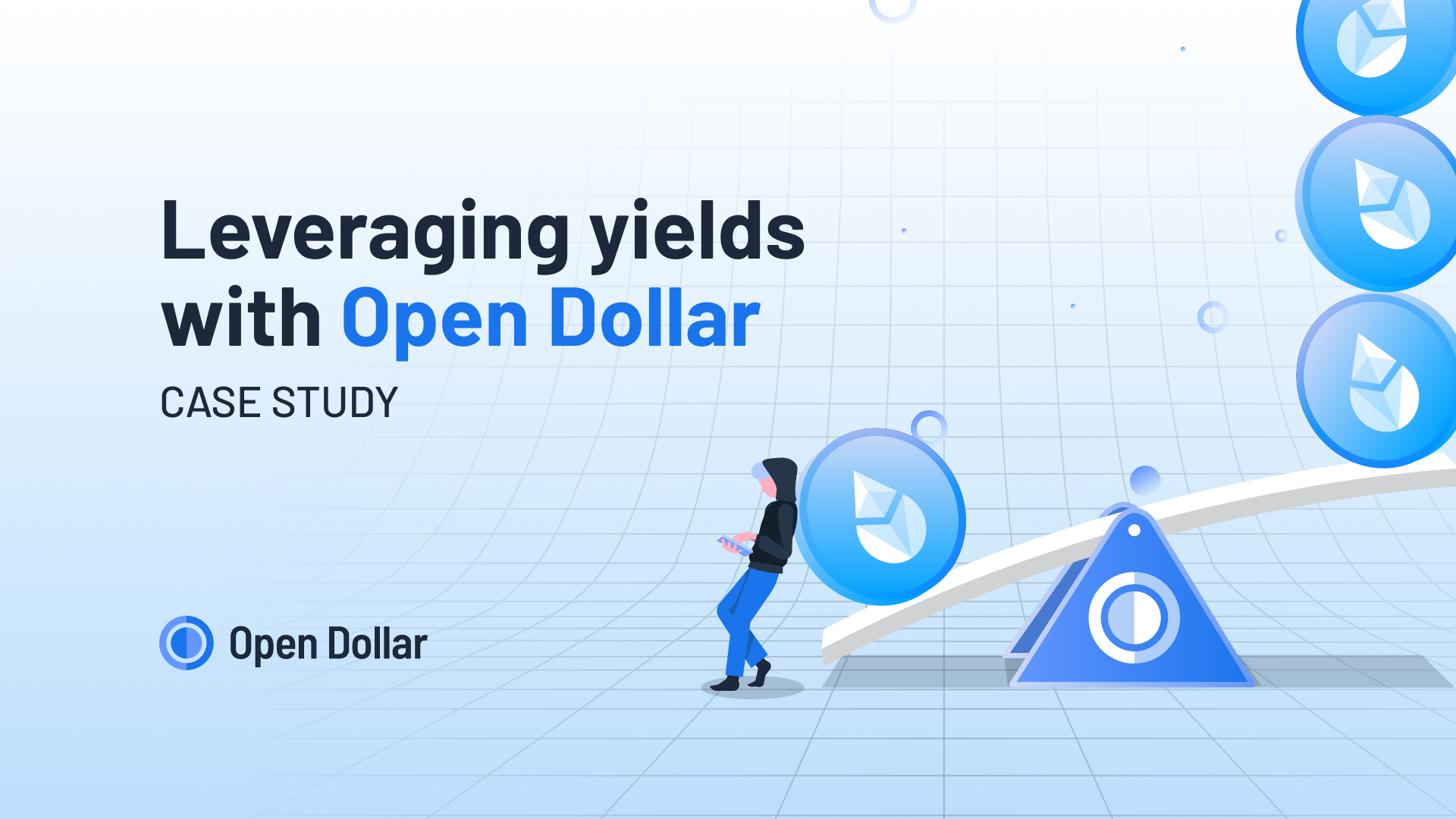Leverage

Leveraging a vault position involves using borrowed funds to purchase more of the collateral asset with the goal of increasing yields. This process can be repeated a number of times until the desired values are reached. With each step of leverage, a number of key values change, usually in the same direction after step 1.
Below is a case study of the leverage process using a position of wstETH on Open Dollar, the recent average value of wstETH at the time of writing ($4,000) and its historical average APY, both of which fluctuate. The user’s objective in this scenario is to maximize their yield while maintaining a collateralization ratio of at least 140%.
Disclaimer: This is not financial advice.
Initial Funds: 10 wstETH ($40,000)
Net APY: $1,520 (10 wstETH x 3.8% APY)
Example vault parameters for wstETH:
- Minimum collateralization ratio: 125%
- Liquidation threshold: 120%
- APR for borrowing: 1.85%
Step 1
User deposits the full amount of collateral, 10 wstETH, and borrows the maximum amount of OD, which they then use to purchase the maximum amount of wstETH and deposit it into the vault.
- Current Collateral Value (Before Borrowing): 10.00 wstETH ($40,000)
- OD Borrowed: $32,000
- Total Borrowed Value (OD): $32,000
- wstETH Purchased: 8.00
- New Collateral Value: 18.00 wstETH ($72,000)
- New Collateralization Ratio: 225.00%
- Leverage Multiple: 1.80x
- Liquidation Threshold: $1,481.48 per wstETH
- Net APY: 5.36% ($2,144)
Upon the first step of leverage, the user has nearly doubled their deposited collateral value and built a position with a very high collateralization ratio, very low liquidation threshold relative to the current price of wstETH, and increased their net APY by 41.05% compared to their original yield. While leveraging a position typically carries more risk, the collateral ratio upon this step is relatively safe compared to un-levered CDPs.
Step 2
In the second step of leverage, the same process is repeated: The user borrows the maximum amount of OD after depositing the newly purchased wstETH collateral.
- Current Collateral Value (Before Borrowing): 18.00 wstETH ($72,000)
- OD Borrowed: $25,600
- Total Borrowed Value (OD): $57,600
- wstETH Purchased: 6.40
- New Collateral Value: 24.40 wstETH ($97,600)
- New Collateralization Ratio: 169.44%
- Leverage Multiple: 2.44x
- Liquidation Threshold: $1,967.21 per wstETH
- Net APY: 6.61% ($2,644)
With the position now leveraged to a multiple of 2.44x, the net APY of 6.61%($2,644) is an increase of 73.95% of the original of 3.8%($1,520), inclusive of borrowing fees. Note that the liquidation threshold has also risen and the collateralization ratio has dropped relative to the previous step.
The Trend
Repeating the process detailed in the previous steps, the user borrows the maximum amount of OD after depositing the newly purchased wstETH collateral. With each step of leverage, the values continue to change in the same direction as the previous step:
Increasing Values
- Current Collateral Value (Before Borrowing)
- New Collateral Value
- Total Borrowed Value (OD)
- Leverage Multiple
- Liquidation Threshold
- Net APY
Decreasing Values
- OD Borrowed
- wstETH Purchased
- New Collateralization Ratio
As more collateral is purchased from additional borrowing, the net yield, liquidation threshold, and leverage multiple increases in addition to the total collateral value and outstanding debt. The amount available to borrow falls in each step due to the minimum collateralization ratio requirement of 125%, limiting borrowing power to 80% of your added collateral value in each step. Also, the total collateralization ratio decreases as the amount of debt rises relative to the amount of collateral.
Step 3
In the third step of leverage, the same process is repeated:
- Current Collateral Value (Before Borrowing): 24.40 wstETH ($97,600)
- OD Borrowed: $20,480
- Total Borrowed Value (OD): $78,080.00
- wstETH Purchased: 5.12
- New Collateral Value: 29.52 wstETH ($118,080)
- New Collateralization Ratio: 151.23%
- Leverage Multiple: 2.95x
- Liquidation Threshold: $2,204.16 per wstETH
- Net APY: 7.61% ($3,044)
Step 4 - Target Reached
- Current Collateral Value (Before Borrowing): 29.52 wstETH ($118,080)
- OD Borrowed: $18,816
- Total Borrowed Value (OD): $94,464
- wstETH Purchased: 4.10
- New Collateral Value: 33.62 wstETH ($134,464)
- New Collateralization Ratio: 142.34%
- Leverage Multiple: 3.36x
- Liquidation Threshold: $2,341.74 per wstETH
- Net APY: 8.41% ($3,364)
In the final step, the user reaches their target collateralization ratio with a leveraged position of 3.36x more wstETH collateral than their original amount of 10 wstETH. They now have nearly 3,364) versus their original yield of only 3.8% ($1,520), inclusive of the 1.85% APR borrowing fees.
The liquidation threshold is now at $2,341.74, or roughly 41.5% less than the market price of wstETH when they began. Depending on the risk tolerance and yield goals of the user, they could continue, but in this scenario, they have reached their target and are comfortable with these values.
We hope you enjoyed this case study on leveraging your vault. As reflected on our Roadmap, a selectable leverage slider is planned for release that will automatically loop your vault to the desired leverage value without repeating this process manually. If you have any questions, feel free to ask us in our Discord!